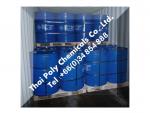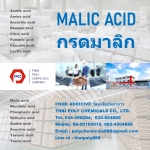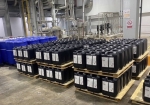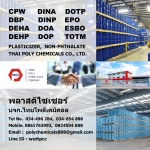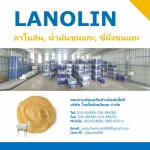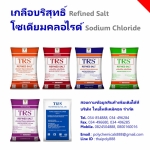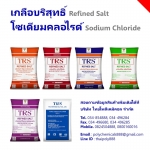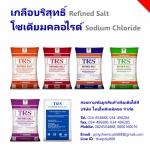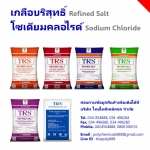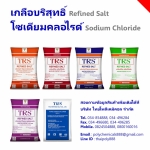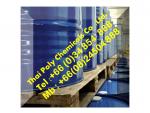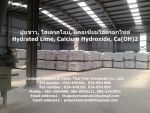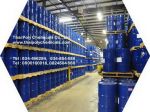ไตรคลอโรเอทิลีน Trichloroethylene TCE |
฿1 |
|
ชื่อผู้ประกาศ : อัศวิน เบอร์โทรศัพท์ : 034854888, 034496284 โทรศัพท์มือถือ : 0800160016 ที่อยู่ : 36/5 ม.9 ต.นาดี อ.เมืองสมุทรสาคร ร้าน TPCC |
1,1,2-Trichloroethylene (TCE), ไตรคลอโรเอทิลีน, ไตรคลอโรเอตทิลีน
ในงานอุตสาหกรรมที่ต้องใช้ตัวทำละลาย
ไตรคลอโรเอทีลีนเป็นสารอีกตัวหนึ่งที่ใช้เป็นตัวทำละลาย มันเป็นของเหลวใส ไม่มีสี กลิ่นคล้ายอีเทอร์และคลอโรฟอร์ม คุณสมบัติที่สามารถละลายไขมันได้ดี จึงเหมาะกับงานทำความสะอาดคราบไขมัน เช่น ทำความสะอาดผิวโลหะในชิ้นส่วนอิเล็กทรอนิกส์ และอุตสาหกรรมซักแห้ง
ประโยชน์/การใช้งาน
1,1,2-Trichloroethylene (TCE) ใช้ล้างคราบน้ำมันต่างๆ การชะล้างดีมาก ล้างงานโลหะ
1,1,2-Trichloroethylene (TCE) เป็นตัวทำละลายไขมัน ขี้ผึ้ง เรซิ่น น้ำมัน ยาง สี น้ำมันเคลือบเงาและ
เซลลูโลส เป็นตัวทำละลายในอุตสาหกรรมอินทรีย์เคมี อาหาร และผลิตภัณฑ์ทางเภสัชกรรม
The chemical compound
trichloroethylene (C2HCl3) is a chlorinated hydrocarbon commonly used as an industrial solvent. It is a clear non-flammable liquid with a sweet smell. It should not be confused with the similar 1,1,1-trichloroethane, which is
The IUPAC name is trichloroethene.
Industrial abbreviations include TCE, trichlor, Trike, Tricky and tri. It has
been sold under a variety of trade names. Under the trade names Trimar and
Trilene, trichloroethylene was used as a volatile anesthetic and as an inhaled
obstetrical analgesic in millions of patients. Trichloroethylene is an
effective solvent for a variety of organic materials.When it was first widely produced
in the 1920s, trichloroethylene's major use was to extract vegetable oils from
plant materials such as soy, coconut, and palm. Other uses in the food industry
included coffee decaffeination and the preparation of flavoring extracts from
hops and spices. It has also been used for drying out the last bit of water for
production of 100% ethanol.From the 1930s through the 1970s,
both in Europe and North America, trichloroethylene was used as a volatile
anesthetic almost invariably administered with nitrous oxide. Marketed in the
UK by ICI under the trade name Trilene it was coloured blue (with a dye called
waxoline blue) to avoid confusion with the similar smelling chloroform. TCE
replaced earlier anesthetics chloroform and ether in the 1940s, but was itself
replaced in the 1960s in developed countries with the introduction of
halothane, which allowed much faster induction and recovery times. Trilene was
also used as a potent inhaled analgesic, mainly during childbirth. It was used
with halothane in the Tri-service field anaesthetic apparatus used by the UK
armed forces under field conditions. As of 2000, however, TCE was still in use
as an anesthetic in Africa. It has also been used as a dry cleaning solvent,
although replaced in the 1950s by tetrachloroethylene (also known as
perchloroethylene), except for spot cleaning where it was used until the year
2000. Trichloroethylene was marketed as 'Ecco 1500 Anti-Static Film Cleaner and
Conditioner' until 2009, for use in automatic movie film cleaning machines, and
for manual cleaning with lint-free wipes. Perhaps the greatest use of TCE has
been as a degreaser for metal parts. The demand for TCE as a degreaser began to
decline in the 1950s in favor of the less toxic 1,1,1-trichloroethane. However,
1,1,1-trichloroethane production has been phased out in most of the world under
the terms of the Montreal Protocol, and as a result trichloroethylene has
experienced some resurgence in use as a degreaser. TCE has also been used in
the United States to clean kerosene-fueled rocket engines (TCE was not used to
clean hydrogen-fueled engines such as the Space Shuttle Main Engine). During
static firing, the RP-1 fuel would leave hydrocarbon deposits and vapors in the
engine. These deposits had to be flushed from the engine to avoid the
possibility of explosion during engine handling and future firing. TCE was used
to flush the engine's fuel system immediately before and after each test
firing. The flushing procedure involved pumping TCE through the engine's fuel
system and letting the solvent overflow for a period ranging from several
seconds to 30?35 minutes, depending upon the engine. For some engines, the
engine's gas generator and LOX dome were also flushed with TCE prior to test
firing. The F-1 rocket engine had its LOX dome, gas generator, and thrust
chamber fuel jacket flushed with TCE during launch preparations. TCE is also
used in the manufacture of a range of fluorocarbon refrigerants such as 1,1,1,2-Tetrafluoroethane more
commonly known as HFC 134a
สอบถามข้อมูลเพิ่มเติมได้ที่
ฝ่ายขายThai Poly Chemicals Co., Ltd.
บริษัท ไทยโพลีเคมิคอล จำกัด
ที่อยู่36/5 ม.9 แขวง/ตำบลนาดี เขต/อำเภอเมืองสมุทรสาคร จังหวัดสมุทรสาคร รหัสไปรษณีย์74000
Tel.: 034854888,
034496284
Fax.: 034854899,
034496285
Mobile: 0824504888,
0800160016
Website :
www.thaipolychemicals.comEmail1 : thaipolychemicals@hotmail.com
Email2 : info@thaipolychemicals.com
DOPDiethyleneglycolไดเอทิลีนไกลคอลDBPทีซีอีไตรคลอโรเอทธิลีนTrichloroethyleneTCEไตรคลอโรเอทิลีนDEG

